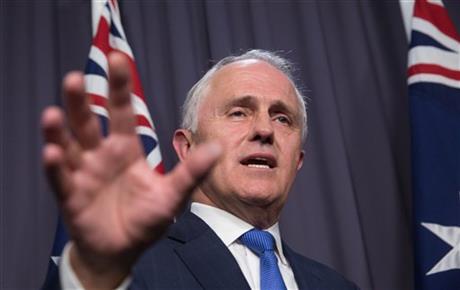
By ROD McGUIRK
Australia’s ruling conservatives ousted beleaguered Prime Minister Tony Abbott as party leader Monday evening in a change that could signal a different Australian response to climate change and allow for a more moderate agenda that could include recognition of gay marriage.
Liberal Party members voted 54 to 44 to replace Abbott with former party leader and Communications Minister Malcolm Turnbull, who had called for the leadership ballot just hours earlier amid flagging opinion polls for the 2-year-old conservative coalition government.
Turnbull split his coalition and lost the party leadership in 2009 over his support for a then-Labor Party government’s proposal to make industrial polluters pay for the carbon gas emissions that they produced through an emissions permit trading scheme.
A coalition government under Abbott last year repealed a 2-year-old carbon tax and replaced it with a policy of paying industrial polluters 2.55 billion Australian dollars ($1.8 billion) in taxpayer-funded incentives to operate more cleanly. The policy imposes no financial penalty for polluting and critics say it won’t be enough to reduce Australia’s heavy reliance on abundant reserves of cheap coal to generate electricity.
In his first news conference since he was elected party leader, Turnbull foreshadowed no changes to climate policy.
“Policies are reviewed and adapted all the time,” he said. “But the climate policy is one that I think has been very well designed. That was a very, very good piece of work.”
Turnbull declined to discuss any other potential policy changes, emphasizing that his leadership style would be collaborative. Abbott was often accused of making rogue policy pronouncements.
Turnbull supports gay marriage and previously proposed that Parliament vote on legalizing it before elections due around September next year.
Abbott, who opposes gay marriage, proposed avoiding divisive public debate by holding a post-election direct vote that electoral authorities estimated would cost AU$158 million ($113 million).
Turnbull will become Australia’s fourth prime minister in just over two years when he is sworn in on Tuesday.
The change does not undermine the security of the government which commands a clear majority in the House of Representatives, the chamber where parties form government. Any no-confidence motion proposed by Labor against the new prime minister would be doomed to failure.
The political turbulence comes as Australia enters its record 25th year of continuous economic growth. However a cooling mining boom that helped Australia avoid recession during the global financial crisis has slashed tax revenue and a hostile Senate has blocked key parts of the government’s financial agenda.
Turnbull’s return to the helm will also likely lead to a major cabinet reshuffle, with Treasurer Joe Hockey and Defense Minister Kevin Andrews among ministers who publicly supported Abbott.
Foreign Minister Julie Bishop, who supported Turnbull’s bid, was re-elected party deputy, defeating Andrews 70 votes to 30.
Abbott made no comment to media after the ballot.
The Liberals were elected in 2013 as a stable alternative to the then-Labor government. Labor came to power under Kevin Rudd at elections in 2007, only to dump him for his deputy Julia Gillard in 2010 months ahead of elections. The bitterly divided and chaotic government then dumped Gillard for Rudd just months before the 2013 election.
Before Rudd was elected in 2007, John Howard was in power for almost 12 years.
Monday night’s contest pitted a man who has been described as the most socially conservative Australian prime minister in decades against a challenger some think is not conservative enough.
“This country needs strong and stable government and that means avoiding at all costs Labor’s revolving-door prime ministership,” Abbott told reporters before the ballot.
Turnbull earlier said the government was doomed to defeat with Abbott as leader.
“Ultimately, the prime minister has not been capable of providing the economic leadership our nation needs,” Turnbull told reporters. “He has not been capable of providing the economic confidence that business needs.”
Nick Economou, a Monash University political scientist, said before the ballot the party had “done enormous damage to themselves” through the challenge.
The government has trailed the opposition in a range of opinion polls since April last year. Abbott survived a leadership challenge from within his party in February that was prompted by those polls and what some say were questionable judgments he made. At the time, Abbott asked his colleagues to give him six months to improve his government’s popularity.
That deadline passed without a change in public opinion.
Turnbull, a 60-year-old former lawyer and merchant banker known for his moderate views, has long been considered Abbott’s chief rival. After Turnbull was opposition leader for two years then lost a party-room ballot by a single vote to Abbott in 2009, he considering quitting politics at the 2010 election after only six years in Parliament.
Opinion polls show that Turnbull is more popular than Abbott, but many of those who prefer him vote for the center-left Labor Party.
Turnbull is the type of classical liberal that has become rare in the oddly named party, which has been overrun by conservatives in recent decades. It was called the Liberal Party when it was established in the early 1940s because it believed in individual freedoms, while their Labor opponents favored state control and heavy regulation.
Abbott and Turnbull are both Rhodes scholars. Abbott, a 57-year-old former Roman Catholic seminarian, has long suffered an image problem, particularly among women. He is regarded as gaffe-prone and old-fashioned in his views on women’s place in society. Bishop was the only woman in his first Cabinet.
Turnbull is a self-made multimillionaire regarded by some as arrogant and has been nicknamed “The Silvertail,” an Australian term for wealth and privilege.



